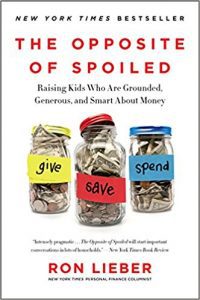In a world of consumerism, constant commercials, and general luxury, how do we raise children with grit? Children that aren’t entitled, are giving, and are prepared to fight through difficult times to reach their goals without sinking into debt? Ron Lieber, New York Times “Your Money” columnist, tackles these issues and more in his book The Opposite of Spoiled.
I first read Lieber’s book while I was still pregnant with my first son and I found myself reading large pieces of it out loud to my husband. The Opposite of Spoiled is possibly my favorite book to guide parents in raising financially smart kids. After reading it again just recently, I wanted to share why all parents need this book!
Table of Contents
Book Review: The Opposite of Spoiled by Ron Lieber
 Overall Rating: (5.0/5.0)
Overall Rating: (5.0/5.0)
Who Is It For:
This book is for every parent who has ever worried about spoiling their kids. Written in a way that acknowledges the emotional difficulties of talking about money with our children, it won’t tell you exactly how much allowance, if any, is right for your child. But it will give you the tools to make an informed decision for your family.
What I Liked:
More than any other book I’ve read on children and money, and I’ve read a lot, Lieber understands that money lessons, at their core, aren’t about the money. And that our choices around when and how to talk to our kids about money are more emotional than practical.
Whether we like it or not, money is a part of almost every decision we make in life. So talking about money with our children means reflecting on, and often explaining, our own choices. A scary prospect for most of us! But, avoiding the topic isn’t the answer. Raising kids who can be self-reliant and generous means helping them build a healthy relationship with money early on. Then, it can be a building block for smart decisions the rest of their lives.
Lieber understands the difficulties parents face in these conversations and limitations. His book gives strong, practical ways and support for tackling these issues for the benefit of your kids.
What I Didn’t Like:
There isn’t much I don’t love about this book. My Amazon Kindle copy is well highlighted and annotated. The one thing I will note is that, by design, this book is written for higher income parents with the luxury of spoiling their kids. If money is tight and your biggest questions surround what expenses parents should cover and what kids can cover themselves, you may be best served with another text.
Where to Buy: Purchase The Opposite of Spoiled on Amazon!
Top Quotes from The Opposite of Spoiled
While nothing can beat reading the book in its full form, there are some great snippets to pull from The Opposite Of Spoiled. The below quotes are some of my favorites and encapsulate Lieber’s excellent philosophy and understanding around raising financially smart kids.
Remembering what it is like to be a child
Take yourself back to those moments when a parent could have enlightened you about money but didn’t. Or when they were whispering so you couldn’t hear. How did it make you feel? And do you want your kids feeling the same way, to know innately that money is important but also utterly off limits as a topic of conversation? – Ch. 2, p. 17
One of the most common things I hear from other parents is that they want to protect their kids from “adult” issues like money for just a little longer. But the reality is, kids are perceptive. Often more so than we hope they would be.
Lieber understands that delaying the conversation to protect their innocence is more about letting ourselves off the hook than it is about helping our kids. The average 3-year-old understands the basics of money. Let’s give our kids the benefit of the doubt, the way we wished adults did when we were younger.
Be ready for your kid to ask the hard questions
It’s their [your kids’] job to ask questions, even presumptuous ones rooted in outsize expectations. Most of us will eventually be in a position where they’ll ask us to explain our own large purchases or extravagances. What will we say? Is every car or vacation defensible? And what does it mean if we are defensive about it?… After all, they just want to know what we stand for; our spending choices is one way that we articulate this. – Ch. 5, p. 95
At 22 months, my son isn’t old enough yet to ask about the absurdly priced, handcrafted cutting board I purchased when we had a perfectly good plastic one at home. But he is old enough to recognize when Mommy is drinking juice after telling him juice has too much sugar.
Whether it is money, food, or TV habits, children have an incredible way of holding up a mirror to our own actions. And that is scary. Lieber understands that talking about money may mean facing habits we have long ignored in ourselves. But he also guides us to recognize that we need to address these issues if we want to avoid passing them on to the next generation.
Let your kids work!
Kids like to work and enjoy earning money, we just don’t do a good enough job of encouraging their industriousness and helping them find new ways to earn. – Ch. 7, p. 149
Toddlers love helping wipe the counters, clear their dinner plate, or push the vacuum. Slightly older kids shine when given $5 for helping rake leaves in the backyard. By discouraging these habits at a young age, it only makes it harder for your children to understand the relationship between work and money at an older age. Even if doing so, once again, feels like protecting their innocence.
I’ve talked before about how I think summer jobs make a huge impact on kids. And the benefits of part-time jobs for college students, including stronger grades. But the desire and interest to work isn’t reserved for kids 16 and up (or 14 and up on most farms).
Lieber points out that encouraging our kids to work earlier, even just at home, will give them more than hands-on experiences with money before being released into the big, wild world. It will also teach them valuable life experiences crucial for long-term success.
Life is about far more than money
Over the 20 years or so that our children live with us, we should try to have just enough conversations about money and the values behind our financial decisions. Only then will they have a complete picture of where we stand, what we stand for, and how we make financial decisions. – Ch. 9, p. 206
Money may play into our everyday lives, but it isn’t the central focus. And it shouldn’t be. Making every experience or conversation in your child’s life about money isn’t the right answer. Not only will they likely start to zone you out, it could suffocate your kids into never wanting to hear another word on the subject.
Raising financially smart and generous kids is a long-term project. It means reflecting on our own feelings and values on the subject and sharing enough to make those values seem automatic to our kids.
In The Opposite of Spoiled, Lieber succeeds in helping parents define “enough” for their families. Pick up the book today and raise a grounded child!
Have you read The Opposite of Spoiled? What was the most compelling takeaway for you? If you haven’t, what is your favorite book on raising financially smart kids? Share in the comments so we can all become better money guides for our children!




Looks like a great book. Will try and read it myself!
I think my son is fine right now, but then I also realize that the parents of spoiled kids probably don’t realize it either. I live in constant fear of spoiling him, may be this will come in handy.